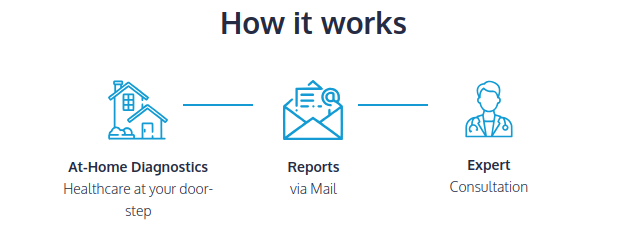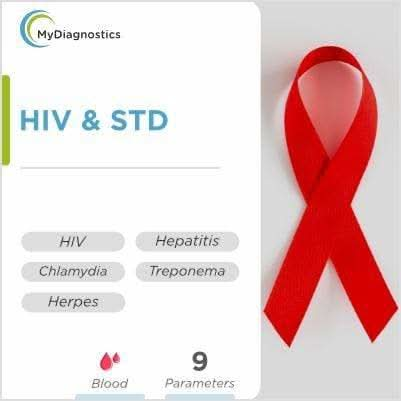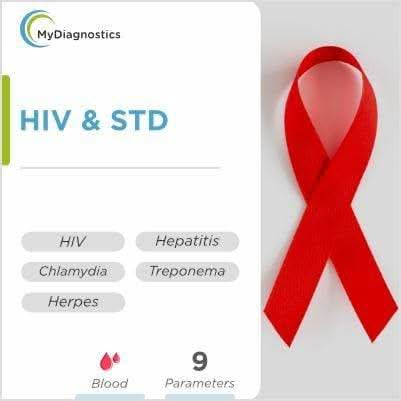Complete HIV Test & STD Testing at Home in Chennai
Test Parameters

About the Complete HIV & STD Test in Chennai
The complete STD & HIV test in Chennai is a comprehensive testing kit for at-home screening of sexually transmitted diseases. The STD panel test Chennai package provides testing for HIV 1 2 and 9 STD types for complete clarity on the risk and development of disease. The HIV test Chennai package provides a fast partial report within 24-48 hours, giving you quick results so that you can begin treatment.
The complete STD panel Chennai kit enables at-home testing for maximum convenience along with sample analysis at an National Accreditation Board for Testing and Calibration Laboratories (NABL) certified lab. This ensures that your blood sample is tested with quality and accuracy in reporting in mind. You can get the STD and HIV diagnosis via email, giving you the right information to take the right next steps.
What is HIV ?
HIV (human immunodeficiency virus) is a virus that attacks your immune system thereby weakening it. This leaves the person susceptible to infections and diseases, which can further deteriorate the immune response. If untreated, HIV can lead to the disease AIDS (acquired immunodeficiency syndrome). It is best to get tested for HIV if you are experiencing chronic symptoms, to understand your HIV status.
What are the common types of STI's and STD's other than HIV/AIDS ?
Some of the most common STDs and STIs are:
- Chlamydia.
- Genital herpes
- Genital warts or human papillomavirus (HPV). Certain high-risk types of HPV can cause cervical cancer in women
- Gonorrhea
- Hepatitis B
- Syphilis
- Trichomoniasis.

What are the causes of HIV
HIV infections are caused by the human immunodeficiency virus. You can get HIV from contact with infected blood, semen, or vaginal fluids.
- Most people get the virus by having unprotected sex with someone living with HIV.
- Another common way of getting it is by sharing drug needles with someone who is infected with HIV.
- The virus can also be passed from a mother to her baby during pregnancy, birth, or breastfeeding
HIV doesn't survive well outside the body. So it can't be spread by casual contact
like kissing or sharing drinking glasses with an infected person.

What are the symptoms of HIV
HIV may not cause symptoms early on. People who do have symptoms may mistake them for the flu Common early symptoms include:
- Fever
- Sore throat
- Headache
- Muscle aches and joint pain
- Swollen glands (swollen lymph nodes)
- Skin rash
The early symptoms usually go away within 2 to 3 weeks.
After the early symptoms go away, an infected person may not have symptoms again for many years. After a certain point, symptoms reappear and then remain. These symptoms usually include:
- Swollen lymph nodes
- Extreme tiredness
- Weight loss
- Fever
- Night sweats
What is STD testing?
Sexually Transmitted Diseases (STDs) and Sexually Transmitted Infections (STIs) can be tested with the help of a blood sample and urine tests, as recommended by the CDC. HIV being one of the many STDs can be tested via an at home blood test offered by MyDiagnostics. This safe, home based test for common STDs and STIs except HIV as well, like chlamydia, genital warts, syphilis, herpes etc.
Some of the main reasons why STD testing is important are as follows -
Testing for exposure risk
Regardless of if you know that you have an STD, a test can help you understand your risk exposure. If you have previously been in contact with someone who has tested positive, then it is right to get tested immediately to analyse your risk profile.
Spreading of STD to partner
Whether you are in a monogamous relationship or have multiple partners, speaking to your partner is important. You should also know your STD status so that you can track it to ensure that you don't accidently spread it to your partner.
Escalation of disease/secondary conditions
Untreated STDs can lead to worse conditions, especially as it relates to your sexual health. Sex organs can be immediately affected, with HPV being a critical cause of cervical cancer and sexual health deterioration.
Critical for long-term sexual health
You should also get tested to ensure that you can have a normal sexual life long-term. Treating an STD is simplified with the right medication and treatment protocols. You can continue to have a safe and normal sexual life experience when you manage your disease effectively.
Preventing unknown spreading
You should also get STD tested as a precaution if you have multiple partners. This can help prevent unknown spreading, and risk of future medical or other issues from partners that may have contracted a disease from you.
Do I need an STD test for working or studying in a foreign country?
Yes, some countries require complete STD & HIV testing prior to entering. You can reference the list of tests required for entering the country, and verifying it through the complete STD package offered by MyDiagnostics. You can also call us directly for any clarifications or testing information.
Can STD testing be done through urine?
A variety of testing can be prescribed such as urine or blood, physical examination, swab test as suggested by the doctor. It is ideal to get tested via blood tests, so that you are able to get complete and accurate results. Blood tests are also more reliable and can be shared with doctors to get their opinion.
Are STD testing considered preventive care?
Testing for STDs and HIV fall under preventive care.
Does STD testing include hepatitis as well?
Yes, this STD home based test also includes a test for hepatitis B and C. These tests are scientifically designed to provide a complete detection kit for any risk factors relating to STDs.
How do I reduce my risk of contracting an STD?
With the right precautions, STDS and STIs are largely preventable. One of the best ways to stay safe while having sex is use condoms. Condoms are a preliminary barrier to the spreading of STDs within partners. It is also important to talk to your partner about testing for STDs prior to engaging in sex.
The CDC recommends that everyone get tested at least once every few months if you are sexually active with multiple partners. The only way to know for sure that you are negative for an STD is to get checked against multiple types of tests.
If the result is negative then you have stayed protected from contracting disease or infection sexually. Also regular sexual testing, AIDS tests, and rapid HIV test protocols can help you track your status over time if you have previously tested positive for HIV.
How can I prevent spreading an STD to other people?
The right approach to prevent spreading STDs to others is to get STI testing regularly. Consulting with your doctor about an HIV diagnosis can also help you become more aware of your status. You should only continue to have sex after your STD test is negative.
An STD panel test or sexually transmitted diseases test will be the right way to continue monitoring your STD status. You should consult with your health care provider about the right steps for treatment, including medication and regular testing.
What are the 3 types of tests for HIV?
The three main types of tests for HIV are antibody testing, RNA viral load determination test, and an antibody-antigen test. You should get tested as soon as you start to experience symptoms and have been at risk of exposure. A complete STD screening Chennai test will provide specific information on what STDs you may be at risk of.
What is the difference between HIV 1 and 2?
HIV 1 is the most common form of the virus, present in 95% of cases worldwide. While HIV 1 is easier to transmit to other people than HIV 2, it contains a higher viral load. You need to test for both types of HIV to be completely informed of your HIV status. A blood test can be performed to detect the HIV 1 and 2 antibodies to know whether you have the disease.
How to read HIV test results?
Your complete STD test Chennai package will have all instructions mentioned to perform the at-home sample collection. The results from the NABL certified laboratory will be shared as negative, positive, or indeterminate for the testing panel of STDs.
Rapid blood tests show two lines if positive or one line if negative, in a similar way as a pregnancy test
-
Negative or non-reactive means you are HIV negative. You do not have HIV
-
Positive or reactive means the test shows you are HIV positive and you have HIV infection.
-
Indeterminate means the test result was unclear and needs to be repeated.
How soon can HIV be detected by a blood test?
There are 3 ways in which people living with HIV can get tested -
-
Nucleic Acid Test (NAT) - A NAT can usually tell you if you have HIV infection 10 to 33 days after exposure
-
Antigen/Antibody Test— This test can detect HIV infection 18 to 45 days after exposure. This is a type of blood test.
-
Antibody Test—An antibody test can take 23 to 90 days to detect HIV infection after an exposure. Antibody tests that use blood from a vein detect HIV sooner after infection than tests done with blood from a finger prick or with oral fluid.
How to get tested for HIV at home in Chennai?
You can get a quality STD & HIV test at home in Chennai through MyDiagnostics. You can place an order, perform the at-home sample, and get your report via email. This is a highly convenient test option for anyone travelling, shifting to a new country, entering a courtship, or planning for a family.
What is the cost of an HIV and STD home test kit in Chennai?
The analysis of STD & HIV test cost in Chennai is INR 3500 for all 10 critical test indicators. You can get a comprehensive assessment performed at-home with all report information shared via email.
This is an ideal test for anyone looking to be protected long-term from complications emerging from STDs. The STD test cost in Chennai is also optimized through MyDiagnostics, giving you maximum test indicators in the most efficient cost for regular testing.
What is the contact number for MyDiagnostics for STD panel test in Chennai?
We are easily available via phone, WhatsApp, and email. You can give us a call at +9108047166161 for any queries. You can also call us to know more about how to perform the test as well.
What does an STD test include?
This test offered by MyDiagnostics offers STD testing across 9 parameters -
-
Anti Hepatitis C Virus (Anti HCV) - Total
-
Hepatitis B Surface Antigen (HbSAg)
-
Anti Chlamydia Antibody IgG
-
Anti Chlamydia Antibody IgM
-
Herpes Simplex Virus II (HSV) - IgG
-
Herpes Simplex Virus II (HSV) - IgM
-
Treponema Pallidium Antibody (TPAB)
-
Treponema Pallidium Haemagglutination (TP
-
VDRL (screening for Syphillis)
- HIV and STD home based blood tests can detect types of common Sexually Transmitted Diseases such as Chlamydia, genital herpes, treponema, Syphilis, HIV.
- Prevalence of STD is on the rise, in-case of symptoms or a doubt please get tested at home.
- Certain STD infections can cause long - term health problems like infertility but can be treated easily.
- Early detection of common STDs like chlamydia and herpes can help in starting the treatment early.
- Avoid consuming alcohol 24-48 hours before the blood test
- A fasting period of 10-12 hours should be followed before the test.





